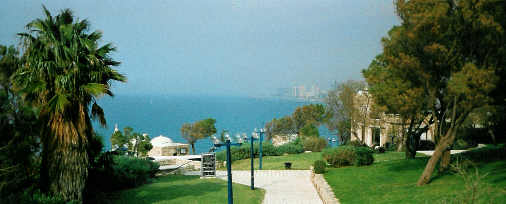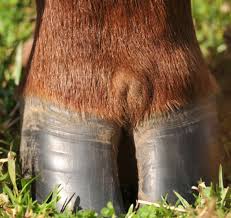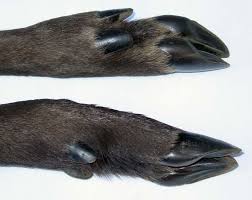Understanding Clean and Unclean
We are often told that since the Messiah came, we are free to eat anything we wish, and are not bound by any of the dietary laws of Scripture.
In fact, one of the ways throughout history that Jews were called on to prove they were truly converting to Christianity (and not just pretending for reasons of personal advantage) was by eating pork. It even became traditional to eat ham on Easter to celebrate the "triumph of Christ over the old Jewish ways".
But this could not be further from the spirit of Yeshua the Messiah or His earliest followers who wrote the New Testament.
But Didn't He Declare All Foods Clean?
This is a widespread belief that highlights the very real danger inherent in building doctrines based on English translations.
One popular version of Mark 7:18-19 reads,
"...whatever goes into the man from outside cannot defile him, because it does not go into his heart, but into his stomach, and is eliminated. (Thus He declared all foods clean.)"
Yet what the Greek from which it was translated actually says is,
"...because it does not enter into his heart, but into his stomach, and goes out into the toilet, purging all foods."
The word for "purging" is the word from which we get "catharsis"--i.e., a cleaning-out. In other words, the body cleans itself out naturally. "Catharsis" can mean "cleansing", but this does not fit the grammatical context. The whole phrase "thus he declared" is nowhere to be found in the original! If he did mean to contradict YHWH's earlier instruction, then he was, by his own measure, someone of very little consequence:
"Whoever breaks one of the least of these commandments and teaches men to do the same will be called least in the Kingdom of heaven." (Matt. 5:19a)
No, YHWH did not change His mind. He still considers eating swine's flesh abominable. (Isa. 65:4; 66:17) Yeshua was not even talking about different kinds of food in Mark 6. What he did mean is clear; he explains in the next verse that men don't have to eat unclean foods in order to be defiled; they are already defiled by what is in their hearts. Getting a little dirt from unwashed hands into one's system (which is what started the argument in the first place) is so minor in comparison to that, that it is basically a joke.
When Paul says things like, "Nothing is unclean in itself" or "One man has faith that he may eat anything", we have to remember that every Scripture must be taken within the parameters set by the earlier Scriptures. Most of what he said about foods had to do with meat offered to idols, anyway, not unclean meats. They were not even considered food to start with, so they were already excluded from the question. Whatever he said has to fit with the rest of Scripture, especially the five books of Moses:
"To the Torah and to the Testimony! If they do not speak in agreement with these words, it is because there is no light in them." (Isaiah 8:20)
Wasn't Peter Told to Eat Unclean Beasts?
Shim'on Peter (Kefa), one of Yeshua's
closest followers, had a vision in Yafo
(pictured at right), in which a sheet
full of all kinds of animals, clean and
unclean, was lowered from the sky.
He was told, "Arise, Peter, kill and
eat!" (Acts 10) When he objected, he
was told, "What Yahweh has cleansed, do not call unclean." So that means YHWH cleansed every kind of food after all, right? We can eat now anything without being concerned about those old-fashioned regulations?
That's not the message Peter got from this vision. In fact, after the same thing had happened three times, he was still very puzzled about what this could mean. (v. 17) He knew Scripture well enough to know what it could not mean, but what did it mean? The answer came right away. Some Gentile men were at the door of the house where he was lodging, and when Peter told them the story of what had happened, he made clear what the only meaning that he had drawn from it was:
"Now I understand very well that YHWH is not one to show partiality, but in every nation the man who fears Him and does what is right is welcome to Him." (v. 34)
It was people, not food, that YHWH was concerned about! (See 1 Corinthians 9:9-10.) The sheet of unclean animals was just an illustration.
Now, there is much to say for the physical benefits of the diet YHWH prescribed:
"If you will listen very carefully to [and obey] the voice of YHWH your Elohim and do what is right, and give ear to all His commandments and carefully preserve all His prescribed limits, I will put none of the diseases on you that I brought on the Egyptians, because I am Yahweh who makes you healthy." (Ex. 15:26)
In a very real way, "we are what we eat". Eating blood has indeed been found to cause many types of cancer. The danger of trichynosis from eating pork is well known. Shellfish are actually poisonous several months out of the year. They are what filters the impurities out of the oceans, and they keep those inside their own shells; would we really want to eat that? And we could go on and on. So yes, there are definitely hygienic reasons to eat clean foods as the Bible defines them.
But this reason can only be taken so far. The priests who worked in the Temple had to have a doctor on hand because of the stomach problems they incurred by eating so much meat, yet they were obeying YHWH by doing so. Ultimately, "YHWH's Kingdom is not a matter of eating and drinking, but of righteousness and peace and joy in the spirit of holiness." (Romans 14:17) He is not so concerned about what we eat as with what we learn from it. The main point of the dietary laws is what they teach us. Now this does not cancel the literal commands:
"...Hypocrites! You tithe mint, anise, and cummin, but neglect the weightier matters of the Torah--justice, mercy, and faithfulness! These are what you ought to have done--without neglecting the others [either]." (Matthew 23:23)
Yeshua said to get to the heart of the matter, but we can't learn much from what we aren't doing. But YHWH constantly reiterates that we must both "do and observe" the things He commands —not just "jump through hoops", but find out the deeper meaning behind the loving instruction of our Heavenly Father. It is a gift He gives to help us know Him better. Do we really want to refuse such a gift?
So What Kind of Things Can we Learn?
Clean animals must both have a divided hoof
and chew the cud (Lev. 11), like the cow,
sheep, goat, or deer. A divided hoof makes an
animal sure-footed. The three pilgrimage-
festivals are literally called "three feet" (or legs)
in Hebrew. (Ex. 23:14) A three-legged piece of
furniture is the most stable. If we follow
YHWH's calendar instead of man's, we will
have stability. Our "walk" also means the way
we live out our faith.
Chewing the cud, as a cow does, is a picture of meditating on YHWH's Word "day and night" (Joshua 1:8) -- i.e., over and over, until it goes deep into our hearts and can be eventually feed those who are young in faith.
A pig, on the other hand, has a cloven hoof and therefore looks clean on the outside. His "walk" may look wonderful, but it will eat anything and cannot pass impurities from its body since it cannot sweat. It is a picture of indiscriminately taking in any and every "wind of doctrine", whether from Yahweh or men. So we are not to eat swine.
Learning to Make Distinctions
One of the explicit reasons YHWH gave Israel His instructions was so that we would learn to "make a distinction between holy and unholy, between unclean and clean." (Lev. 10:10; 11:46-47)
This does not just refer to food. One of the most poignant examples of being unclean was the disease of leprosy. Every time in Scripture that we see someone specifically stricken with this affliction (Miryam, Elisha's servant Gehazi, and King Uzziah), he or she was desiring a position he or she had not been allotted.
Thus, being ritually "unclean" is a picture of
being selfish. Other types of ritual uncleanness
involve activities necessary in this world but
which somehow touch death or corruption.
(Lev. 5:2; Lev. 11-15; Numb. 19; Deut. 23:14)
Likewise, a selfish choice may not in itself be
a sin, but it is a path that leads us away from
love for one another, which is life as YHWH
defines it. So it is something to be avoided--a
plague to our souls.
As we see in the Sermon on the Mount, Yeshua does not relax the commandments in the least; rather He often makes them stricter. The Apostles did the same. When deciding on the "ground rules" for new believers who were returning to YHWH from among the Gentiles, they considered four prohibitions indispensible:
"Abstain from pollutions of idols, from illicit sexual intercourse, from things strangled, and from blood." (Acts 15:20).
A meat can be clean yet not not kosher (which means "acceptable" or "appropriate"). Chicken is a "clean" meat, but if its blood is not removed, it is still not to be eaten, since we may not eat animals with their life [literally, soul] still in them (Gen. 9:4), and "the life of the flesh is in the blood." (Lev. 17:11)
But this word rendered "strangled foods" was specifically used of any animal killed without being bled, but with the wider connotation of anything not killed according to Jewish practices. Though Moses only said all the blood must be taken out, the Apostles went further and said Gentiles should eat only what is kosher by Jewish standards. This was so that Jews and Gentiles could begin to share the same dinner tables, since Jews, from whom these Gentiles needed to learn how to live a holy life, would not eat from a table where unclean foods were being eaten. Any further argument is a moot point. All who accept the Messiah are now part of the Commonwealth of Israel (Ephesians 2:12), so the Covenant made with Israel for all its generations applies to us all:
"I am YHWH your Elohim, who has made a distinction between you and other peoples. Therefore, you must make a distinction between clean animals and unclean, and not make your souls abominable by means of any animal ...which I have separated from you as unclean. Then you will be set apart unto Me, because I have set you apart from other people, to be Mine." (Lev. 20:24ff)
In other words, "Your body is the Temple of the Holy Spirit." (1 Cor. 6:19) What we do with it matters; we can't just spiritualize it away. He wants us to "both divide the hoof and chew the cud": not choose between the letter and the spirit of His instruction, as so many have done, but be among those who both "believe and are zealous for the Torah" (Acts 21:20), who "keep the commandments of Yahweh AND have the Testimony of Yeshua". (Rev. 12:17)




